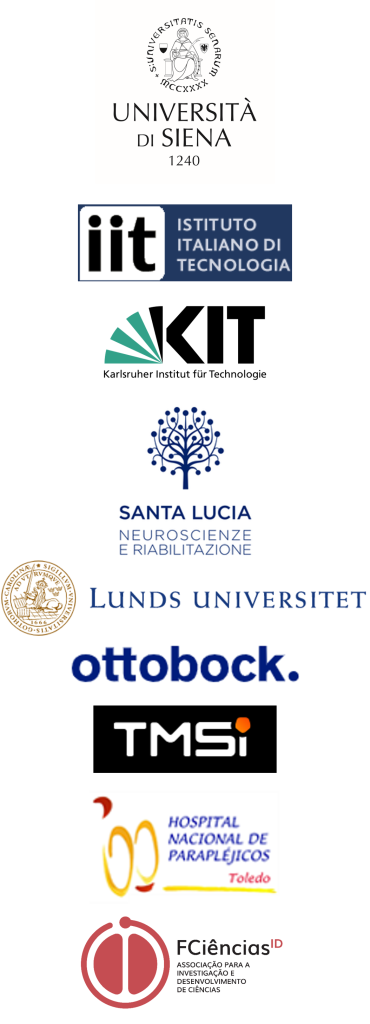
Università degli Studi di Siena (UNISI, Coordinator), www.unisi.it
Istituto Italiano di Tecnologia (IIT), www.iit.it
Karlsruher Institut fuer Technologie (KIT), www.kit.edu
Fondazione Santa Lucia (FSL), www.hsantalucia.it
Ottobock SE & CO. KGAAE (OBG), www.ottobock.de
Lunds Universitet (LU), www.lu.se
Twente Medical Systems International B.V. (TMSI), www.tmsi.com
Hospital Nacional de Parapléjicos (SESCAM), https://hnparaplejicos.sanidad.castillalamancha.es/
FCIENCIAS.ID – Associacao Para a Investigacao e Desenvolvimento de Ciencias (FC.ID) – Faculdade de Ciências da Universidade de Lisboa, https://www.fciencias-id.pt/
The HARIA Consortium has been assembled starting from a main core composed of UNISI and FSL, interested in the development and control of supernumerary robotic limbs, and in their application to assist post-stroke patients with upper-limb disabilities. The group of partners has grown by involving additional key experts selected according to their complementary expertise. The team of IIT has a long-lasting experience in building mechatronic systems able to compliantly interact with humans. KIT was included for its expertise in robot learning and autonomous control, and in techniques for context awareness. LU expertise in participatory design and user acceptance of assistive technology, as well as on gender aspects, is fundamental to ensure the use and uptake of HARIA devices. Also OBG is expert in studying users’ needs related to assistive technology and has a clear understanding and knowledge about the current developments and the market opportunities in the field. TMSI was chosen as it is a leading SME in the development of (electro)physiological measurement systems and sensors, and has experience in the transformation of research products into certified medical devices. SESCAM was contacted for its expertise in rehabilitation of SCI patients, to enrich the project with additional end-users that might dramatically benefit from HARIA technologies. In April 2024, thanks to a successfull HORIZON-WIDERA Hop-on Facility proposal, the Consortium was enriched with a new partner, FC.ID. Its expertise in robot learning and control will contribute to build a failure management framework for the HARIA technologies.

